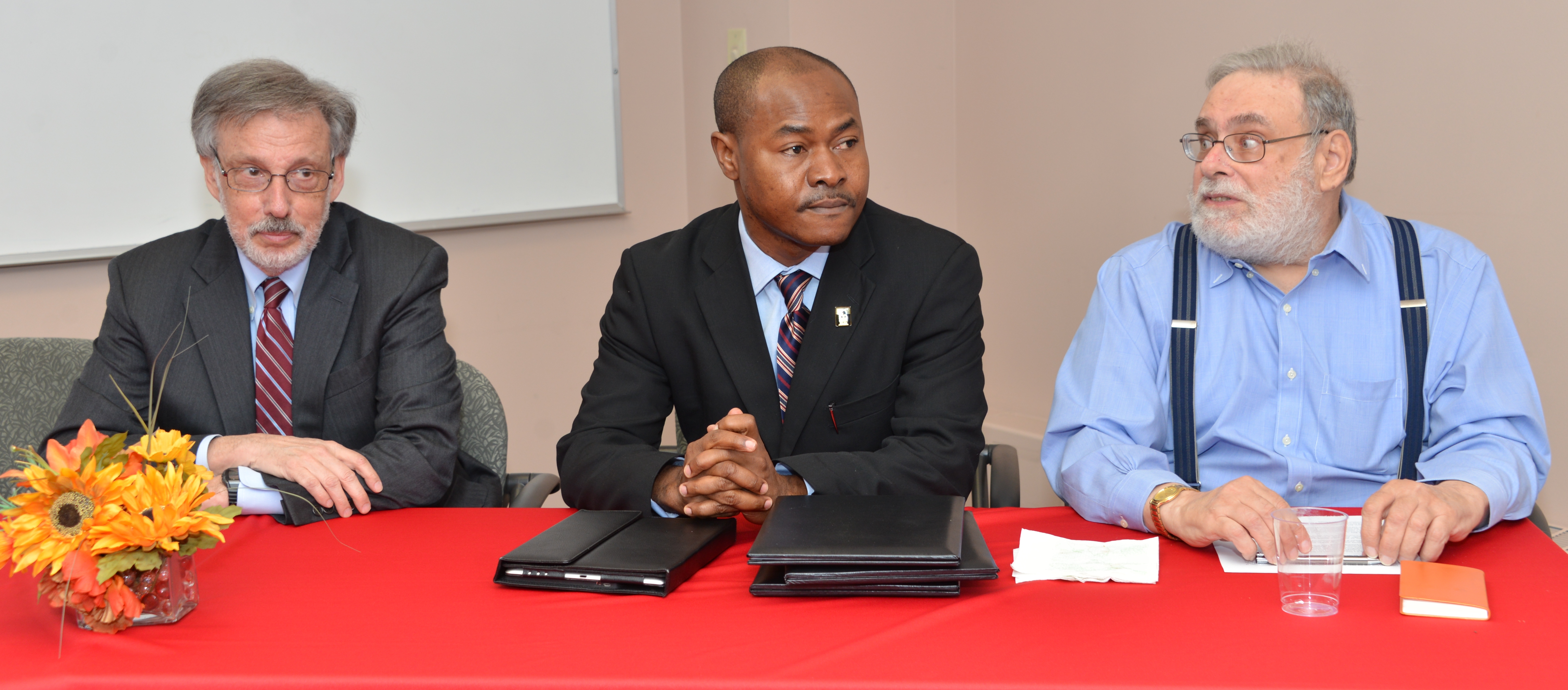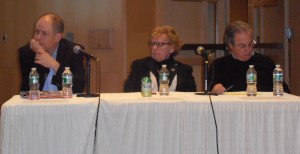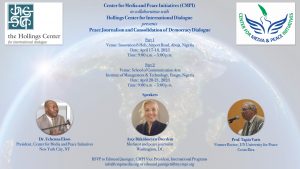By Uchenna Ekwo
Valery Yegorov, a Ukrainian-American could not hide his disapproval of the media coverage of the unfolding crisis in Ukraine by major media networks in the United States at the 3rd annual media and democratic conference hosted by Center for Media & Peace Initiatives and Rutgers University last week. Yegorov, a U.S. Department of State contract interpreter responded to comments by the Permanent Representative of Ukraine to the United Nations, Dr. Yuriv Sergeyev who fielded questions from conference participants on wide ranging issues related to Ukraine and spin in the media.
“ CNN, FOX News, and MSNBC and all the American media organizations are not reporting adequately events going on in Ukraine and the Russian media are having a field day feeding the world with propaganda and misleading information” Yegorov pointed out. According to him, these networks are just obsessed with the search for the Malaysian airliner that disappeared more than a month ago. The bottom line is that the Ukrainian expected better and informed coverage of the crisis in his country by the powerful US media.
Considering Yegorov’s frustration and the fact that the theme of the conference was “Seeing through Spin: Sorting Fact from Fiction in Public Information”, I began to think about uses and abuses of information in an information age. In an era of mistrust, what is the definition of information? What is misinformation or disinformation for that matter?

We may live in an era of information overload and yet we still desire information about different aspects of our lives – be it economy, healthcare, wars, and in the case of people residing in foreign countries they would be curious to receive information from home and host countries. Obviously, the international news media has tremendous influence in what becomes news or what information is made available to information consumers.
For example, the crisis in Ukraine, the missing Malaysian airline, the anniversary of Boston bombing, and the bombing few days ago in Nigeria that killed about 200 people. These separate events attract different treatments in major international news organizations. There are so many reasons why BBC News, CNN, and Al Jazeera might report a bombing incident that killed 3 persons and 200 people differently.
Reflecting on the dichotomy in news coverage of international events and issues, I couldn’t help thinking of Jay Rosen’s conceptualization of journalism as having what he phrased as “awayness problem”. Rosen, a journalism professor at New York University imagined “a world where journalism as an activity, and journalists as an occupational group, do not exist, but news does”. Think about it! There is always information or news happening around us on a regular basis but as Rosen reasoned journalism and journalists make the difference as purveyors of information because a journalist says” I was there, you weren’t; let me tell you about it”. The telling aspect of the journalists’ job brings into vortex the challenge of misinformation and disinformation.
In my view, misinformation could occur as a mistake. Inaccuracy in reporting or analysis of issues could be categorized as misinformation. Disinformation, on the other hand, is a deliberate effort to mislead the audience for reasons ranging from pecuniary to patriotic. Clearly, Russian news organizations are engaged in disinformation because they believe they are defending the Russian state. During the US led invasion of Iraq, some journalists embedded with the military engaged in propaganda activities more for the love of their country than their profession. Instead of intense focus on the elusive weapons of mass destruction, the media unwittingly became a weapon of mass deception.
However, when POLITICO labels conservative radio talk show icon, Rush Limburgh, Sean Hannity of FOX News, Glen Beck of Blaze TV, and radio talk show host, Mark Levin as The Tea Party Radio Network it takes the unethical practice disinformation to a whole new level. According to POLITICO, these media personalities earn millions of dollars from conservative groups to advocate purely partisan agenda with little or no effort to balance their reporting and analysis of issues and events.
The late Daniel Patrick Moynihan, a former United States Senator from New York is famous for saying that “everyone is entitled to his own opinion, but not to his own facts”. While there is no agreement on what truth is and, therefore, what information is, it is understandable why most news media organizations around the world are inundated with so much facts and fiction or “faction” (a combination of facts and fiction). The ideologically-driven news presentations of Fox News and MSNBC provide concrete examples of news organizations that continue to mix information, misinformation and disinformation. The networks mix truths, half-truths, and outright falsehood in the reporting and presentation of news and analysis.
With the growing influence of social media in generating content for traditional news organizations, the incidence of misinformation and disinformation is likely to continue. Social media opens the door for more spin in the news cycle because sloppy news organizations will make little efforts to validate information sourced from personal Facebook or twitter accounts of news makers. In a recent article “who cares if it’s true?”, Marc Fisher remarked that “rare is the news organization that doesn’t occasionally jump on Twitter with half-baked facts, and rarer still is the one that refuses to gin up content about the day’s major trending topics”. Sadly, as Fisher pointed out the imperative for speed in the journalism of tweets has triumphed over traditional ways of completeness, verification, and authority.
Whereas digital journalism may offer unique opportunities for news professionals in terms of speed and connection with varied interests of the audience, it can also aid reporters and especially opinionated journalists to either focus more on the truth or spin the truth depending on their audience.
The ongoing debate about healthcare in the United Sates is a good example. A fascinating CNBC opinion poll about Affordable Care Act and Obamacare provide an insight into the consequences of misinforming the audience. The opinion poll is instructive and indeed a classical lesson in information, misinformation, and disinformation. How do you feel about Obamacare? How about the Affordable Care Act?, respondents were asked. They’re two different names for one law, but the poll shows more Americans oppose the president’s signature health care law when it has his name attached than when it’s called the official name. Some Americans were asked about their support to Obamacare and many of them denounced it but when the same respondents were asked about their opinion on Affordable Care Act, by overwhelming majority they gave a nod of approval to the law. Ironically, the Affordable Care Act and Obamacare is the same thing but the law was given the pejorative name Obamacare by opponents of the healthcare law. The opposition towards the law fueled misinformation among skeptical publics. And a section of the media became vehicles for disinformation.
Everything considered, we may live in an information age but we are increasingly being confronted with loss of knowledge. We may claim to live in an information society designated as one “in which the production, storage, processing, exchange, distribution, and the use of information and knowledge in the form of data, including ever developing technical means of interactive communication, are playing an increasingly dominant role” but when it is not connected with knowledge, there is a problem. The mass media, as purveyors of information must make the connection of providing truthful information to establish a knowledge based society.

Dr. Uchenna Ekwo is the President of Center for Media & Peace Initiatives, New York






